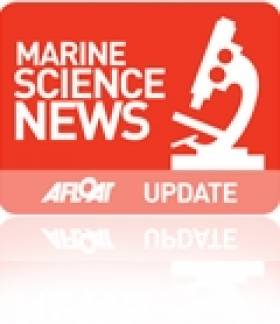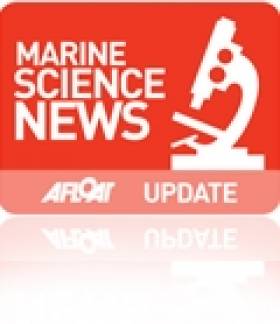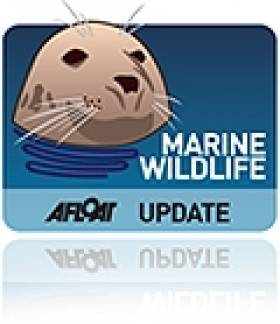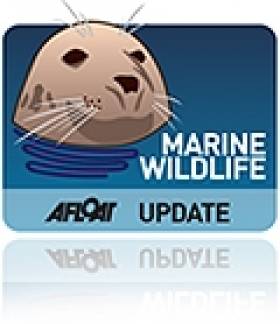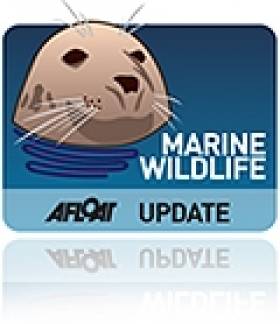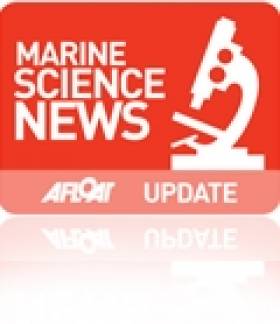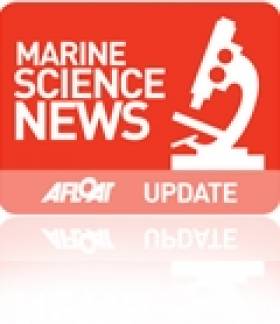Displaying items by tag: Celtic Explorer
Calls Now Open For Marine Reaearch Funding Under EUROFLEETS2
#MarineScience - Applications are now being invited under EUROFLEETS2, an EU-funded project providing scientists with 200 fully funded days of ship-time and 104 fully funded days of marine equipment to carry out ship-based research activities within any field of marine sciences.
EUROFLEETS2 - which had its kick-off meeting gathering more than 60 marine scientists and fleet operators in April this year - aims to bring together the European research fleets to enhance their co-ordination and promote the cost effective use of their facilities.
The Marine Institute’s research vessels, the RV Celtic Explorer and the RV Celtic Voyager, are both available to researchers through the EUROFLEETS ship-time call. Irish researchers can apply for ship-time on these and other European vessels participating in EUROFLEETS2.
EUROFLEETS2 invites applications for the following marine research funding opportunities:
Super-Integration: This call seeks to fund a truly cross-cutting proposal, multidisciplinary, multiyear and/or multiplatform, which needs to mobilise a combination of EUROFLEETS Research Vessels (RVs) together with other appropriate scientific tools like nationals RVs, research planes or onshore infrastructures with their own EC or national funding. All EUROFLEETS RVs and equipment are available for this call. More information at www.eurofleets.eu/np4/59
Embarked Equipment: This call offers fully funded marine equipment time within participating scientific marine equipment (two 3D HD TV cameras, two ROVs and the sea floor drill rig MARUM-Mebo) to be deployed from RVs or from underwater vehicles funded by other sources than EUROFLEETS2. More information at www.eurofleets.eu/np4/60
The application deadline for both funding opportunities is 16 September 2013.
EUROFLEETS2 is a Research Infrastructures project under the seventh Framework Programme of the European Commission. For more information and eligibility criteria visit www.eurofleets.eu.
#MarineScience - Gathering more than 60 marine scientists and research fleets operators from all European eco-regions, the kick-off meeting of the European project EUROFLEETS2 was held in Brest, France from 19-21 March last at the invitation of the French Research Institute for the Exploitation of the Sea (Ifremer) and the French Polar Institute Paul-Emile Victor (IPEV).
Thirty-one research organisations, research fleet managers, universities, and industrialists from 20 EU members states or associated countries participate in the EUROFLEETS2 project, whose main objective is the integration of research fleets currently managed at national level.
This project amplifies the effort initiated since 2009 with EUROFLEETS, which ends in August this year. Again co-ordinated by Ifremer, EUROFLEETS2 has a strong operational component. The project receives significant funding from the European Commission (€9 million of a total budget of approximately € 10.8 million) over four years.
“This provides a fantastic opportunity for Irish researchers to access a wide variety of vessel and equipment across Europe,” said Aodhan Fitzgerald of the Marine Institute’s Ocean Science Services Team. “The Marine Institute is proud and pleased to offer ship time on the national research vessels RV Celtic Explorer and RV Celtic Voyager as part of this project.”
EUROFLEETS2 is organised into three complementary activities – trans-national access; joint technological research; and networking - promoting information sharing, identification of new collaborative frameworks, development of common software tools and also testing innovative integration schemes.
Trans-national access offers the opportunity, fully funded by EUROFLEETS2, to international scientific groups to access research vessels on the basis of scientific excellence of the cruise proposals. After seven European calls for ship-time organised within targeted maritime regions, these scientific groups will embark on eight global/ocean and 14 regional European research vessels distributed all over European and world seas and oceans.
Two new initiatives are also planned in EUROFLEETS2: the first aims to attract scientific leaders and/or non traditional end users to make proposals for a flagship project involving several vessels (‘super-integration’ call for ship-time), while the second makes available an original set of five underwater vehicles or scientific embarked equipment.
Joint research, through dedicated actions, contributes to more modern infrastructures and enriched information services. Three key activities are considered: the definition of regional research vessels guidelines and generic designs, the development of innovative functionalities for underwater systems, and the implementation of data acquisition systems in standardised formats, contributing to a higher interoperability between research vessels.
Networking activity will consist in working groups for a better co-ordination of European research fleets. It will aim to establish a common strategic vision including polar research fleets, experiment new integration schemes like the virtual fleets and strengthen links with industry. Floating universities will complement the actions already undertaken for the training of young European scientists.
The long-term objective of EUROFLEETS2 is to prepare the insertion of a group of innovative and inter-operable regional research vessels in the ESFRI(European Strategic Forum on Research Infrastructures) roadmap.
Calls are now open for fully-funded ship time in polar and subpolar regions as well as for expressions of interest in super-integration.
For the former, EUROFLEETS2 can provide 200 fully funded days of ship time and 104 fully funded days of marine equipment to carry out ship-based research activities within any field of marine sciences. The application deadline is 24 May 2013.
As for the latter, the call seeks a cross-cutting proposal that needs to mobilise a combination of EUROFLEETS research vessels together with other appropriate scientific tools like national research vessels, research planes or onshore infrastructures with their own EU or national funding. All EUROFLEETS research vessels and equipment are available for this call. The expression of interest is not binding but desirable.
The deadline for applications is 15 May 2013. Logistically accepted pre-proposals will be invited to submit a full proposal from 14 June till 16 September 2013.
For more information and eligibility criteria visit www.eurofleets.eu.
'Frontier' Surveyors Meet Sperm Whales and Killer Whale
#MarineWildlife - Sperm whales and a killer whale were among the finds on the last big effort of this year's Cetaceans on the Frontier survey led jointly by the Galway-Mayo Institute of Technology (GMIT) and the Irish Whale and Dolphin Group (IWDG).
As previously reported on Afloat.ie, marine scientists from GMIT's Marine and Freshwater Research Centre are on board the RV Celtic Explorer to carry out the fourth dedicated survey of cetaceans on the continental shelf edge.
The ship was surveying a zig-zag pattern in the Atlantic yesterday 2 February, some 55 nautical miles west-by-northwest of Achill Island (visible on this map HERE) when the team encountered at least two sperm whales, though an elusive third may also have been present - as indicated by the hydrophone being towed 200m behind the vessel.
"The blows continued and as we got closer, more and more body of the surfacing whale could be seen until we were treated to some reasonable views of the steep nose, long flat back and stumpy dorsal fin on initial surfacing followed by a thick tail stock with ‘knuckles’ seen when flaking," writes Niall Keogh on the Cetaceans on the Frontier blog.
Soon after that, the researchers were treated to their first sight of a killer whale in Irish waters - followed by a number of pilot whales surfacing close to the ship.
'Very Rare' Sighting of Albatross in Irish Skies
#MARINE WILDLIFE - Staff and students from the Galway-Mayo Institute of Technology spotted an black-browed albatross in what was a "very rare" sighting of the bird in Ireland's skies, The Irish Times reports.
The group was on board the State marine research vessel Celtic Explorer off the southwest coast when they witnessed the albatross, also known as a Mollymawk, which is noted for its dark eye stripe.
The black-browed albatross is normally restricted to the Southern Hemisphere, but Birdwatch Ireland's Niall Hatch said it has been spotted from headlands in Ireland in the past.
As previously reported on Afloat.ie, the GMIT group were among a party of 20 scientists from Ireland, Nothern Ireland and Scotland carrying out a study of whales, dolphins, seabirds and plankton in the Atlantic.
Student On the Seas for Whale and Dolphin Survey
A mature student from the Galway Mayo Institute of Technology is taking part in the Irish Whale and Dolphin Group's Ship Surveys Programme.
Irish Weather Online reports that Enda McKeogh is on board the Marine Institute's research vessel Celtic Explorer off the west coast of Scotland, where he has already made a number of sightings of whales and dolphins.
He said: "I expected to be sea sick most of the time and not to see many cetaceans but this has proven not to be the case so far."
McKeogh is recording is sightings in a diary on the IWDG website HERE.
Seeing the capabilities of Ireland's largest research vessel and the work of the Marine Institute, Mr Simon Coveney highlighted the importance the Marine Sector has on the Irish economy. "The seas and ocean that surround the land of Ireland is arguably one of our countries greatest natural resources. Through marine research, development and sustainable management, Ireland is developing a strong reputation as an emerging centre of excellence, where we have prominent roles in many European and international marine science bodies," he said.
Ireland's national research vessels RV Celtic Explorer and RV Celtic Voyager will record 627 days at sea between the two during 2011. Their work will range from fisheries surveys to underwater mapping and from climate studies to deepwater surveys with the remotely operated submersible ROV Holland 1.
"The work conducted on the vessels continues to feed into the success in attracting EU funding to Ireland's marine science programmes that have been achieved by our strategic approach to marine science planning" explained Dr Peter Heffernan, CEO of the Marine Institute.
"The award of funding projects shows that partnerships between academics and small businesses can yield significant dividends in creating jobs, generating economic revenue and the supply of raw materials for new industries ranging from ocean energy and environmental monitoring technologies to marine-inspired pharmaceuticals and food ingredients" he further said.
Galway Atlantaquaria Nets Second Education and Outreach Award
Galway Atlantaquaria who, with the Marine Institute, Forfas Discover Primary Science and others are partners in the Explorers marine education and outreach programme, have achieved their second prestigious award - Best Education Project : Public and General Visitor 2010 - from the Britain and Ireland Association of Zoos and Aquaria (BIAZA) for their marine education and outreach activities.
The award, was presented at Paignton Zoo Environmental Park, Devon by Adrian Sanders MP and was given for the "Galway Marine Month of Madness" event, organised by the Atlantaquaria with help from the other Explorers partners during the month of May this year.
Speaking for the Atlantaquaria, Marketing Executive Colette Lavin said that the award was a tribute not only to the Atlantaquaria but to all those involved in the month-long celebration. "A lot of people put a lot of heart and hard work into the individual events that made up the Month of Marine Madness," she said. "And while this second BIAZA award is the most tangible benefit of all this, I really believe that the biggest reward for all our efforts is the raised awareness of the value of our oceans and seas, not only to Galway, but to the rest of the country."
The calendar of events was launched by Galway's Deputy Mayor Mr. Peter Keane at Salthill beach and events arranged during the Month of Marine Madness ranged from seashore safaris, diving lessons, scientific lectures, nature walks and angling demonstrations, to a series of free seminars at the Atlantaquaria on such subjects as Baleen Whales, Slimy
Seaweed, the value of outdoor education, and Pirates! The First Entrepreneurs. A highlight of the calendar was the 'Largest Beach Clean Up in Ireland' which took place on Sunday 18th of May. Over 2,000 members of the public took part in the various events which included a tour of the national research vessel RV Celtic Explorer by 280 pupils from local primary schools.
Speaking for the Explorers Programme, Dr. John Joyce of the Marine Institute said that the effort put in by Colette and her team had raised awareness of the sea to a whole new level in Galway during the month of May. "While Explorers is targeted primarily at raising awareness of the sea in schools, Colette and the Galway Atlantaquaria have shown us how we can raise that awareness to a whole new level by reaching out into the wider community. Last year, the Volvo Ocean Race vividly demonstrated the value of the sea to Galway in terms of tourism revenue. Clearly, the way is open to build on that awareness
and to use our creativity in finding new ways that Galway can profit - financially, educationally and environmentally – from marine related events."
Galway Atlantaquaria, the Marine Institute and the other partners in the Explorers programme celebrated the launch of National Science Week on Sunday 7th November with a Sunday Funday entitled "Our Plaice in Space" to celebrate the connections between outer and inner space.
Later in the month, on November 21st, the Explorers Programme will be present at the Galway Science and Technology Festival in NUI Galway.


























